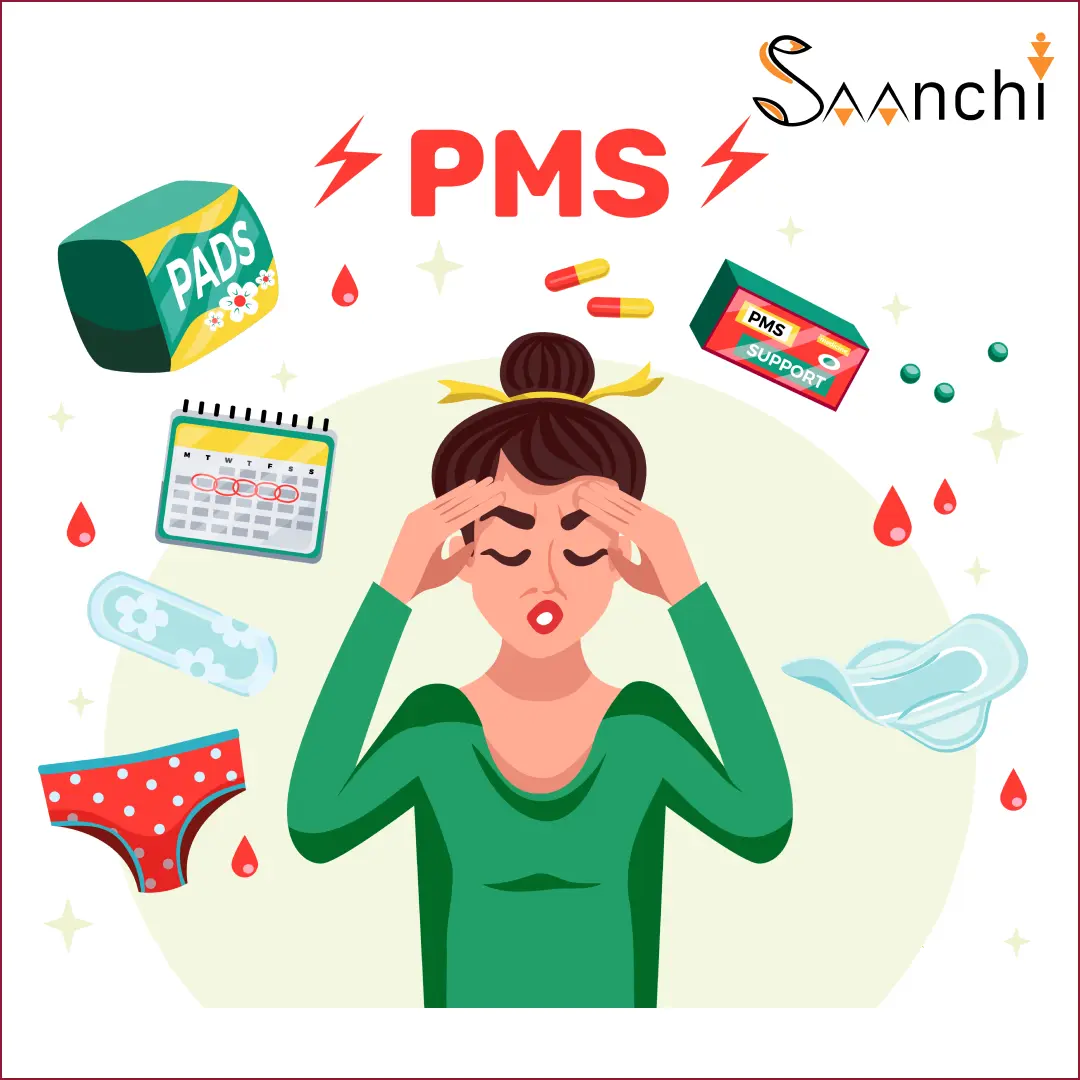Premenstrual Syndrome (PMS) is something many girls and women experience every month. It involves changes in mood, emotions, physical health, and behavior that happen between ovulation and the start of your period. PMS can sometimes be challenging, but understanding it better can help you manage the symptoms more effectively.
What is PMS?
PMS refers to the symptoms that occur after ovulation and before your period begins. These symptoms can be physical, emotional, or behavioral, and they can affect your daily life. PMS is very common, and nearly half of women of reproductive age experience it. For some, the symptoms are mild, but for others, they can be severe enough to disrupt their routine.
Symptoms of PMS
PMS symptoms vary from person to person. You might experience some or all of the following symptoms before each menstrual period:
Emotional and Behavioral Symptoms
- Anxiety and Restlessness: Feeling nervous or on edge.
- Irritability and Anger: Becoming easily annoyed or angry.
- Changes in Appetite: Craving specific foods, especially sweets.
- Sleep Problems: Difficulty sleeping or feeling very tired.
- Sadness and Mood Swings: Feeling sad, crying suddenly, or having rapid mood changes.
- Decreased Interest in Activities: Losing interest in things you usually enjoy.
- Difficulty Concentrating: Finding it hard to focus or remember things.
Physical Symptoms
- Bloating: Feeling like your stomach is full or swollen.
- Cramps: Pain in the lower abdomen.
- Breast Tenderness: Sore or swollen breasts.
- Acne: Getting more pimples than usual.
- Digestive Issues: Constipation or diarrhea.
- Headaches: Experiencing more frequent headaches.
- Back and Muscle Pain: Aches in your back or muscles.
- Sensitivity: Being unusually sensitive to light or sound.
- Clumsiness: Dropping things or bumping into things more often.
When Do PMS Symptoms Begin?
On average, the menstrual cycle lasts about 28 days. PMS symptoms usually start after ovulation, which is around day 14 of your cycle, and can last until a few days after your period begins.
What Causes PMS?
The exact cause of PMS isn’t fully understood, but several factors are believed to contribute to it:
- Hormonal Changes
The levels of hormones like estrogen and progesterone fluctuate during your menstrual cycle. These changes can affect your mood and physical symptoms.
- Brain Chemicals
Neurotransmitters like serotonin and norepinephrine help regulate mood and behavior. Changes in these chemicals can lead to PMS symptoms like mood swings and sleep problems.
- Mental Health Conditions
Existing conditions like depression or anxiety can make PMS symptoms worse. A family history of these conditions can also increase your risk.
- Lifestyle Factors
Habits such as smoking, eating a diet high in fat, sugar, and salt, lack of exercise, and not getting enough sleep can make PMS symptoms more severe.
Managing PMS Symptoms
While there is no cure for PMS, there are several ways to manage the symptoms and make your period more comfortable:
- Stay Hydrated
Drink plenty of water to reduce bloating. Herbal teas like chamomile can also help with cramps.
- Eat a Balanced Diet
Include lots of fruits, vegetables, and whole grains in your diet. Try to cut back on sugar, salt, caffeine, and alcohol, as these can worsen PMS symptoms.
- Get Enough Sleep
Aim for 7 to 9 hours of sleep each night to help reduce fatigue and improve your overall well-being.
- Exercise Regularly
Physical activity can help reduce bloating, cramps, and improve your mood. Aim for at least 30 minutes of exercise a day.
- Practice Self-Care
Set aside time for relaxation, hobbies, or social activities that make you happy. Taking care of your mental health is just as important as taking care of your physical health.
- Use Pain Relief
Over-the-counter medications like ibuprofen or acetaminophen can help with cramps and headaches. Heat pads or warm baths can also provide relief from abdominal pain.
Seeking Help
If your PMS symptoms are severe and affecting your daily life, it’s important to talk to a healthcare provider. They can help you find additional treatments or therapies to manage your symptoms better.
Final Thoughts
Understanding PMS and its symptoms can help you manage this common condition more effectively. By making some lifestyle changes and practicing good self-care, you can reduce the impact of PMS on your daily life. Remember, it’s important to take care of both your physical and emotional health during this time. If you have any concerns or need support, don’t hesitate to reach out to a trusted adult or healthcare professional.


